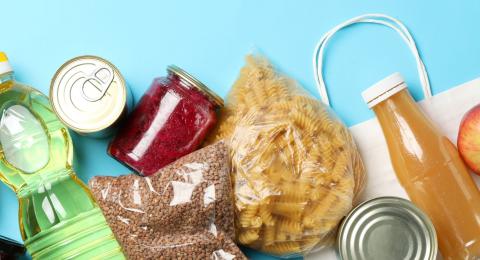Tips for Donating to Food Pantries
The United States has an abundant food supply, yet many people lack access to affordable, healthy, and safe food. In this situation many people rely on food pantries, a vital source of wholesome food for families and individuals.
Donations of food by local farms, food retailers and consumers to food pantries help provide food for people throughout the year. Although the need is great throughout the year, fall is usually the season when people donate to food pantries through food drives in anticipation of the Holidays.
The following guidelines can help you decide what to donate to a food drive or pantry:
Always check with your local food pantry to find out what they need most. Some will only accept cash or certain items.
Consider a cash donation. Cash is useful to food pantries as they can buy quantities of food for less. They can also buy the items most needed by their patrons.
Donate food that is nutritious. Consider non-perishable food, peanut butter, jelly, canned protein. Healthy kid snacks are always welcome.
Purchase food specifically for the food drive. Think about what foods other families like yours might like to eat. Also keep in mind that food pantry recipients’ ages range from infants to elderly.
Donate retail-sized food containers. In other words, the size of items you’d pick up at your local grocery store for yourself or family. Bulk items are not useful at food pantries because they cannot break them down into smaller portions.
Donate food that is undamaged and in its original packaging with labels intact. If canned food has a sharp dent, a dent deep enough to rest a finger in, severe rust pits, swollen or bulging ends or any evidence of leaking, the food is unsafe to eat and should be discarded and not donated. Canned vegetables and meats with any size dent should be thrown away.
Donate date appropriate canned foods. Do not donate food that has passed its “expiration,” “best by,” “use by,” or “sell by” date. This is especially important for infant formulas and baby food. Donate items with a long shelf life.
Food pantries do not accept any home-canned goods nor homemade food. This includes jam & jelly, cookies, brownies, etc.
Donate personal hygiene items for the family. These items are not covered by other food assistance programs and can be costly.
Whatever you choose to donate, do it with compassion for your neighbors. Remember, you can make a difference in someone’s life by donating money, food, or personal hygiene items to a local food pantry.
Search the New Hampshire Food Bank website for a list of food pantries near you. You can also donate directly to the New Hampshire Food Bank. The New Hampshire Food Bank supplies millions of pounds of food annually to more than 420 partner agencies statewide, including food pantries, homeless shelters, soup kitchens, children’s programs, senior centers and more. In turn, these agencies provide hunger relief to those experiencing food insecurity throughout the state.
Thank you to the participants in UNH Extension’s November 19th SAFE for Food Pantries class for their contributions to this article.

